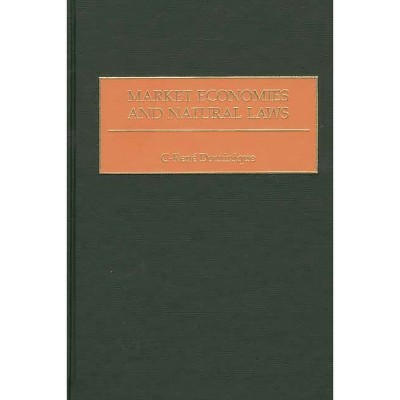Sponsored

Unfettered Globalization - by C-Rene Dominique & Irene Dominique (Hardcover)
In Stock
Sponsored
About this item
Highlights
- Economics, Dominique reminds us, is a social science, with prescriptions that are statistical in character but inherently polemical.
- About the Author: C-RENÉ DOMINIQUE is Professor of Economics at Canada's Laval University.
- 288 Pages
- Political Science, Political Economy
Description
About the Book
Economics, Dominique reminds us, is a social science, with prescriptions that are statistical in character but inherently polemical. In contrast to the laws of the natural sciences, economic statements, meaningful as well as meaningless, can be transformed into a vehicle for the promotion of false consciousness, as when the polemical prescriptions of social sciences are used to promote unavowed interests. The axiomatization of economics in the early 1950s, though well-intended, has produced two negative consequences: the equation of science and mathematical formalism by some, and a total lack of concern for experimentation on the part of others. These translate into excessive abstraction, empirical irrelevance, and a total lack of social purpose.
Dominique argues that excessive abstraction is causing economics to gradually lose its social usefulness. This state of affairs has, in turn, led the general public to accept at face value the prescriptions of an untested orthodoxy, such as unfettered globalization, as genuinely scientific. In the era of unfettered globalization, the top 20 percent of the world's income earners have become richer while the bottom 80 percent have become impoverished and environmental degradation has gone unabated. Dominique argues that, according to the scientific theory of economics, the top quintile must pay the costs and the bottom four quintiles ought not bear alone the brunt of globalization. To reverse this outcome, the bottom 80 percent must become pro-active in economic policy formulation. A challenge to contemporary development and economic policy that will be of interest to economists, public policy makers, the international business community, and social activists.
Book Synopsis
Economics, Dominique reminds us, is a social science, with prescriptions that are statistical in character but inherently polemical. In contrast to the laws of the natural sciences, economic statements, meaningful as well as meaningless, can be transformed into a vehicle for the promotion of false consciousness, as when the polemical prescriptions of social sciences are used to promote unavowed interests. The axiomatization of economics in the early 1950s, though well-intended, has produced two negative consequences: the equation of science and mathematical formalism by some, and a total lack of concern for experimentation on the part of others. These translate into excessive abstraction, empirical irrelevance, and a total lack of social purpose.
Dominique argues that excessive abstraction is causing economics to gradually lose its social usefulness. This state of affairs has, in turn, led the general public to accept at face value the prescriptions of an untested orthodoxy, such as unfettered globalization, as genuinely scientific. In the era of unfettered globalization, the top 20 percent of the world's income earners have become richer while the bottom 80 percent have become impoverished and environmental degradation has gone unabated. Dominique argues that, according to the scientific theory of economics, the top quintile must pay the costs and the bottom four quintiles ought not bear alone the brunt of globalization. To reverse this outcome, the bottom 80 percent must become pro-active in economic policy formulation. A challenge to contemporary development and economic policy that will be of interest to economists, public policy makers, the international business community, and social activists.About the Author
C-RENÉ DOMINIQUE is Professor of Economics at Canada's Laval University. He has worked in the private and public sectors and at the Office of Technical Cooperation at the United Nations. His areas of specialization include industrial studies, planning and policy analysis, microeconomics, and systems' dynamics. Professor Dominique has published extensively in Industry and Development, Economics Letters, Journal of Economic Development, and Journal of International Economic Integration among other publications.










